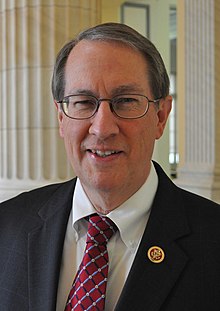
Back بوب جودلات ARZ باب قودلت AZB Bob Goodlatte German باب گودلت Persian Bob Goodlatte Finnish Bob Goodlatte French Bob Goodlatte Italian Bob Goodlatte Polish Bob Goodlatte Swedish 鮑勃·古德拉特 Chinese
Bob Goodlatte | |
|---|---|
 | |
| Chair of the House Judiciary Committee | |
| In office January 3, 2013 – January 3, 2019 | |
| Preceded by | Lamar Smith |
| Succeeded by | Jerry Nadler |
| Chair of the House Agriculture Committee | |
| In office May 31, 2003 – January 3, 2007 | |
| Preceded by | Larry Combest |
| Succeeded by | Collin Peterson |
| Member of the U.S. House of Representatives from Virginia's 6th district | |
| In office January 3, 1993 – January 3, 2019 | |
| Preceded by | Jim Olin |
| Succeeded by | Ben Cline |
| Personal details | |
| Born | Robert William Goodlatte September 22, 1952 Holyoke, Massachusetts, U.S. |
| Political party | Republican |
| Spouse |
Maryellen Flaherty (m. 1974) |
| Children | 2 |
| Education | Bates College (BA) Washington and Lee University (JD) |
Robert William Goodlatte (/ˈɡʊdˌlæt/; born September 22, 1952) is an American politician, attorney, and lobbyist who served in the United States House of Representatives representing Virginia's 6th congressional district for 13 terms. A Republican, he was also the Chair of the House Judiciary Committee, which has jurisdiction over legislation affecting the federal courts, administrative agencies, and federal law enforcement entities. Goodlatte's district covered Roanoke and also included Lexington, Lynchburg, Harrisonburg, and Staunton.
In 2017, Goodlatte presided over a GOP effort, conducted in a secret session, to weaken the independent Office of Congressional Ethics, a move widely criticized by House leaders and the opposition party. The proposal passed by a 119 to 74 vote, but it was withdrawn the following day after widespread public criticism.[1][2] On November 9, 2017, Goodlatte announced that he would not seek reelection in 2018.[3] In February 2020, Goodlatte registered as a lobbyist representing the Project for Privacy & Surveillance Accountability, a nonprofit.[4]
- ^ "US Congress: Republicans vote to limit ethics body". BBC News. Reuters. January 3, 2017. Retrieved January 3, 2017.
...in an amendment to House rules by Congressman Bob Goodlatte, would weaken the body's oversight of matters such as conflicts of interests and financial impropriety .... the new body would no longer be able to receive anonymous tip-offs, nor have a spokesperson, and would be under the supervision of the House Ethics Committee. Accusations against lawmakers would not be made public, as they are currently...
- ^ Lipton, Eric (2017-01-02). "With No Warning, House Republicans Vote to Gut Independent Ethics Office". The New York Times. ISSN 0362-4331. Retrieved 2017-01-04.
- ^ Forman, Carmen (November 9, 2017). "After nearly a quarter century in D.C., Rep. Bob Goodlatte of Roanoke County will not seek re-election". The Roanoke Times. Roanoke, VA. Retrieved November 9, 2017.
- ^ Meyer, Theodoric (February 14, 2020). "Goodlatte registers to lobby". POLITICO. Retrieved April 24, 2020.